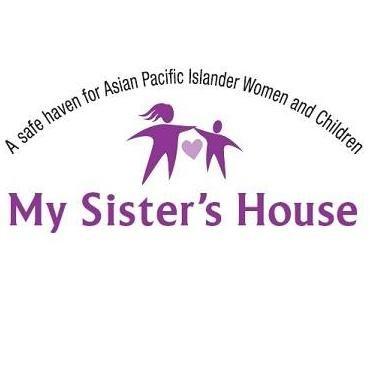It is a vital non-profit organization dedicated to serving Asian and Pacific Islander (API) women and children, as well as other underserved communities, who have been impacted by domestic violence, sexual assault, and human trafficking.
Founded in Sacramento, California, in 1998, the organization emerged from a critical understanding that victims and survivors from these specific cultural backgrounds often face unique barriers to seeking help and recovery, including language difficulties, cultural stigmas, family pressures, and a lack of culturally competent services. My Sister's House fills this crucial gap by providing a culturally appropriate, responsive, and safe haven, along with comprehensive support services aimed at empowering survivors and helping them rebuild their lives.
Core Mission and Philosophy:
At its heart, My Sister's House is driven by a deep commitment to social justice and the belief that every individual deserves to live a life free from violence and exploitation. Their philosophy is rooted in:
- Cultural Competency: Recognizing and respecting the diverse cultural nuances, languages, and specific needs of API communities. They understand that traditional approaches may not always be effective for these populations due to cultural norms around family honor, shame, and community expectations.
- Empowerment and Self-Sufficiency: Beyond immediate crisis intervention, the organization focuses on providing survivors with the tools, skills, and resources necessary for long-term independence, healing, and thriving.
- Holistic Support: Addressing not just the immediate safety needs, but also the physical, emotional, psychological, and economic well-being of survivors.
- Community-Centered Approach: Fostering community education and outreach to challenge harmful norms, prevent violence, and build a more supportive environment.
Run For A Safe Haven 2023
Comprehensive Programs and Services:
My Sister's House offers a comprehensive suite of "wraparound" services, designed to meet survivors at various stages of their journey, from crisis to long-term recovery and independence. These services are often delivered by bicultural and bilingual staff and volunteers, ensuring cultural and linguistic accessibility. Key programs include:
- 24-Hour Multilingual Helpline: This is often the first point of contact for individuals in crisis. The helpline provides immediate support, safety planning, information, and referrals in multiple Asian and Pacific Islander languages, breaking down crucial language barriers that can prevent victims from reaching out.
- Emergency Shelter: Providing a safe, confidential, and culturally sensitive temporary refuge for women and children fleeing violent situations. This shelter is designed to be a "safe haven," offering security and a supportive environment away from abuse.
- Community Outreach and Education: My Sister's House actively works to raise public awareness about domestic violence, sexual assault, and human trafficking within API and other underserved communities. This includes:
- Prevention Programs: Educational initiatives aimed at young people and community members to foster healthy relationships and prevent violence before it occurs.
- Awareness Campaigns: Challenging cultural stigmas associated with violence and encouraging victims to seek help.
- Training for Professionals: Providing training to law enforcement, healthcare providers, and other service agencies on culturally competent responses to violence.
- Intervention Services: Beyond the helpline, this includes direct support such as:
- Case Management: Personalized support to navigate legal, housing, medical, and social service systems.
- Counseling and Support Groups: Providing therapeutic support and peer-to-peer healing spaces.
- Legal Advocacy: Assisting with restraining orders, immigration issues, and other legal needs related to their abuse.
- Relocation Assistance: Helping survivors move to safer environments.
- "Women at Work Program": This flagship program focuses on the economic empowerment of survivors of domestic violence, human trafficking, and sexual assault. It provides crucial support for survivors to gain financial independence, which is often a key factor in breaking free from abusive situations. This program includes:
- Job Training and Skill Development: Equipping survivors with marketable skills for employment.
- Resume Building and Interview Preparation: Practical assistance for job searching.
- Job Placement Support: Connecting survivors with employment opportunities.
- Financial Literacy Education: Teaching budgeting, saving, and financial planning.
- Support for Entrepreneurs: In some cases, fostering pathways for self-employment.
- Child Advocacy: Recognizing the profound impact of violence on children, My Sister's House provides specialized support for children who have witnessed or experienced abuse, including counseling and educational support.
Community Engagement and Support:
My Sister's House is heavily reliant on the generosity and dedication of its community. They welcome and encourage various forms of support:
- Volunteers: Volunteers are integral to their operations, contributing across a wide range of roles, including:
- Domestic Violence Advocates: Providing direct client support on the helpline or in person.
- Office Support: Assisting with administrative tasks.
- Event Support: Helping with fundraising and outreach events.
- Pro Bono Services: Professionals offering specialized skills (e.g., legal, counseling).
- Donations: Financial contributions are essential for funding their programs and services.
- In-Kind Donations: Providing essential items for the shelter and clients.
Social Impact and Legacy:
Since its inception, My Sister's House has provided a critical safety net and pathway to healing for thousands of women and children from underserved communities. Their commitment to cultural relevance and comprehensive support has made them a trusted resource. By sharing testimonials from clients who have benefited from their services, the organization powerfully illustrates the life-changing impact of their work. They stand as a testament to the power of community-led initiatives in addressing complex social issues and building a more just and compassionate society.
